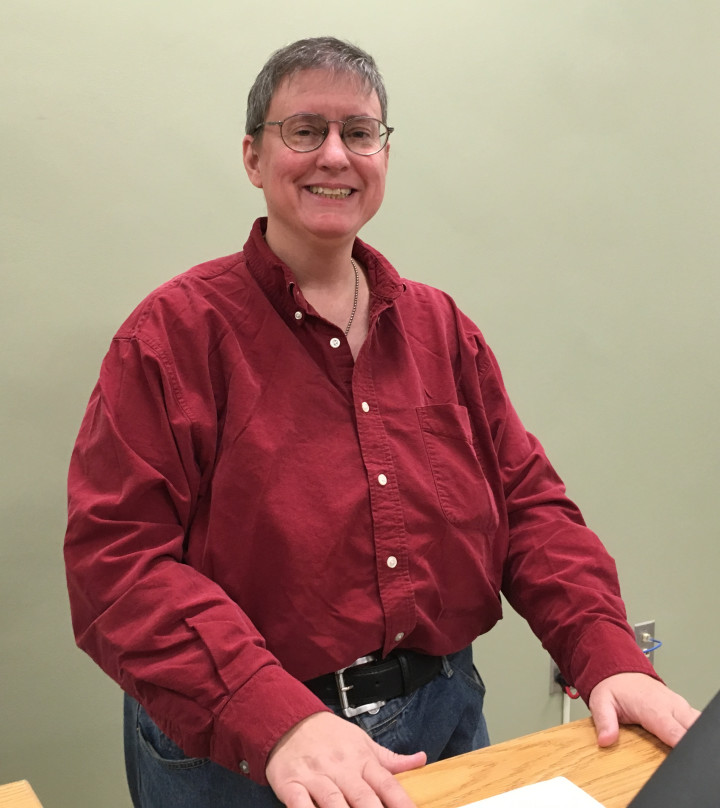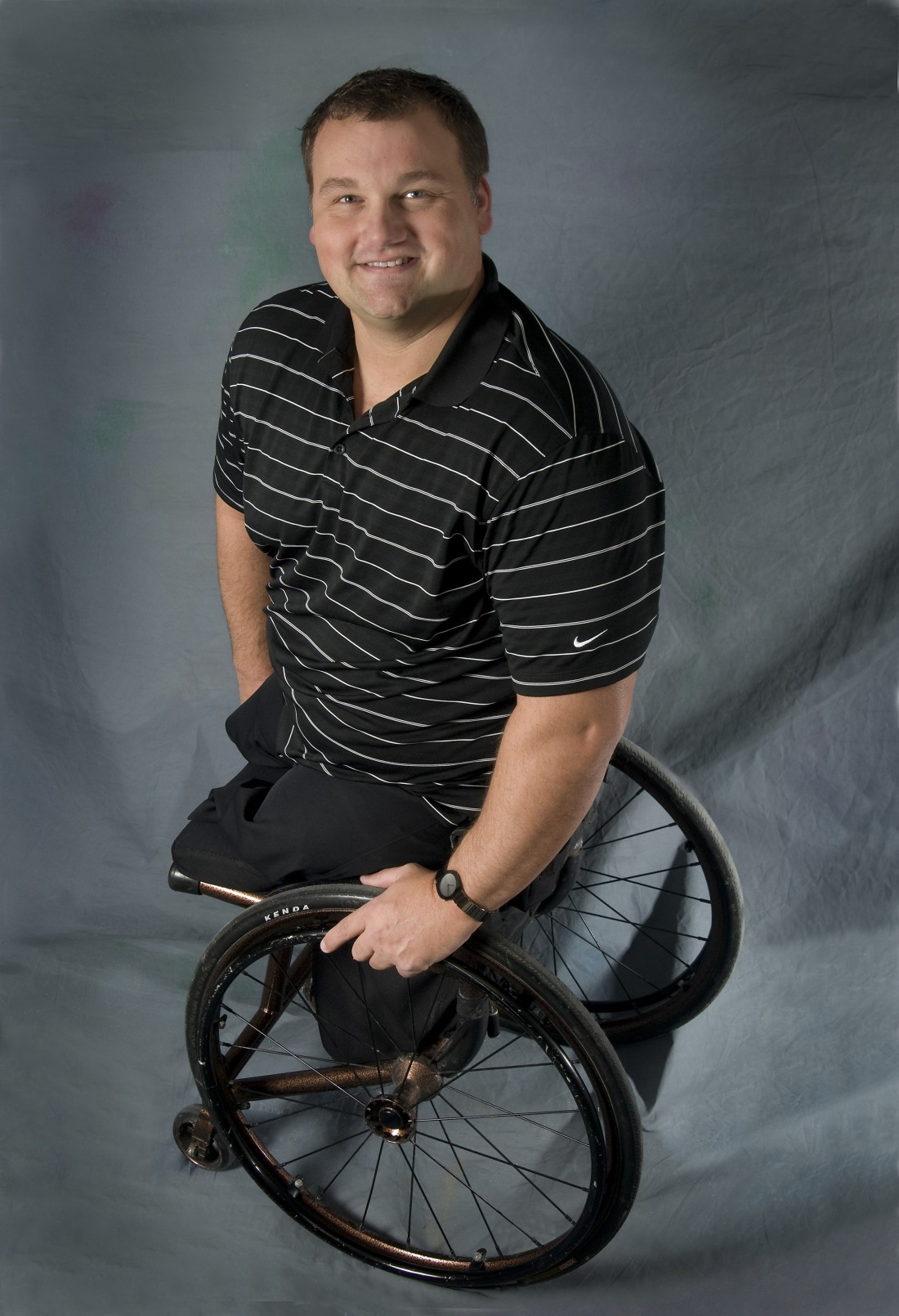Matt Glowacki was born without legs, but that rarely slowed him down. Immediately after the birth, his father expressed concern about about how his son could get around their multilevel home, saying, “We’ll have to sell the house.” The doctor replied, “Don’t sell the house. Give him a chance to surprise you.”
On Nov. 7, Glowacki told this story as the keynote speaker for Disability Is Diversity Week at UNC Asheville.
Glowacki, a Paralympian, diversity speaker and entrepreneur from Sun Prairie, Wis., has been giving talks at college campuses, leadership workshops, diversity events and more since 1999.
During his UNCA presentation, “Able-Bodied Like Me,” Glowacki revealed how important that doctor’s statement was: “My dad swears it totally changed his whole idea about everything. He went from assuming that I couldn’t do anything to giving me a chance to see what I could do.”
According to the U.S. Census Bureau, more than 56 million Americans, or 19 percent of the population, have disabilities, and half their conditions are severe. The Americans with Disabilities Act, passed in 1990, defines disability as a legal term rather than a medical one and applies it to “a person who has a physical or mental impairment that substantially limits one or more major life activity.”
As the nation’s first comprehensive civil rights law addressing the needs of people with disabilities, the ADA also prohibits discrimination in employment, public services, public accommodations and telecommunications.
Wheelchair warrior
“My parents did the best they possibly could to raise me as normally as possible,” Glowacki said during his talk. When he grew too big to carry, they bought him a Tonka truck, which he used to plow new roadways in the shag carpeting of their living room. When it was time to go to school, his parents bought him a skateboard, which gave Glowacki celebrity status and autonomy.
“If you are the only kid allowed to ride your skateboard, you’re instantly the coolest kid in kindergarten,” he said. “I could sit on it, I could push it with my hands, and there was a lot of area in the front to carry my lunch and my books.”
But, in the years before the ADA had passed and required accommodations, a near-miss with an SUV in the school’s drop-off line, years of using prosthetic legs, and what Glowacki describes as a well-timed grocery store incident involving a display of Kraft Macaroni & Cheese, he switched to a wheelchair.
During the keynote, Glowacki said of his high school days, “I really did find myself again, the person I wanted to be. … In a wheelchair, I didn’t need any help. I could get involved in things, and people started seeing potential in me that I didn’t see in myself. Choir, cheerleading. I could do things!”
Glowacki went on to earn his bachelor’s degree at the University of Wisconsin at Whitewater, which had a wheelchair basketball program. He also played sit volleyball, made the Paralympic team in 1998, played for the U.S. for eight years, and now owns three businesses: MOGO Wheelchairs, a wheelchair building and sales business; Glow Music, a mobile DJ and entertainment service; and Myriad Communications, his speaking and consulting company.
Glowacki, thinking back to his father’s words more than definitions and limitations, says, “Wouldn’t it be great if every person you interact with every day, whether you did or didn’t know them, gave you the chance to surprise them in good ways?”
A brilliant, neurodivergent mind
Sparrow Jones, diagnosed with autism at 7 but not aware of the diagnosis until adulthood, also spoke at the UNCA event. (Jones, who is in the process of transitioning from female to male, prefers to use the pronoun “he.”) In his address, titled “Neurodiversity — Creativity and Innovation Thrive When We Welcome Diverse Minds,” Jones explained that neurodivergence encompasses minds that work differently from those of the majority. And it’s a “movement … born in the autistic community but exist[ing] to serve and support all neurologies,” he explained, “particularly those of fellow neurodivergents — people with ADHD, dyslexia, anxiety, bipolar, schizophrenia and more.”
Neurodivergence advocates seek “justice and equality for all of those differently brained people in every sphere of society, including the university,” he said.
But in Jones’ early years, his mother recognized his intelligence but “didn’t want the stigma [of autism] attached. … The only way to keep me in classes that were feeding my mind was to hide anything that might get me put into special ed.”

Jones’ Louisville, Ky., childhood was marked by not speaking, hiding under tables and biting people. In an interview, he recalled bullies hitting him in the head with sticks and throwing bleach on him. After a suicide attempt, Jones turned 19 in a psychiatric hospital and believed he suffered from depression. Adulthood held more challenges.
“I couldn’t keep a job, and I didn’t know why,” Jones said. “I don’t really grasp some of the social things that you’re supposed to do. When people don’t know I’m autistic, they don’t know why I’m different, can’t put their finger it, and it creeps them out,” he said. “They don’t want to work with me, so then the boss fires me. So I spent a lot of my 20s homeless, sleeping in parks, eating out of dumpsters and at soup kitchens.”
Qualifying for disability in 1994, Jones was able to rent an apartment and enroll in college but dropped out several times. Then Jones learned he had Asperger’s, a form of autism. He didn’t believe it. “Autism was Rainman,” Jones said. “No way.”
Struggling to come to terms with the diagnosis, Jones read a blog about autism one day and typed a comment: “I wish I didn’t have Asperger’s.” Through a flash blog, in which knowledgeable people respond to a question at the same time to increase awareness about it, Jones’ statement received “30 letters from people, life-changing letters about accepting who I am. I read all the letters, and I cried,” said Jones.” That’s what made me want to be a part of a community that would do that for someone.”
Jones went on to earn two bachelor’s degrees and is now one class and a dissertation short from finishing a doctoral degree, with two self-published books, No You Don’t: Essays from an Unstrange Mind and The ABC’s of Autism Acceptance. Jones lives and travels in a minivan, advocating for more resources, awareness and accommodations for neurodivergent students so they are best able to express their gifts.
“I stumbled into this, but it’s my life’s mission,” Jones said. “A lot of the things I said [in my talk] today are the things that I try to pay forward to other people.”
From psychosis to valedictorian
Schizophrenia, a mental illness protected by the ADA as a psychiatric disability, appears in 1.1 percent of the population over the age of 18. DO-IT, a disability advocacy group at the University of Washington, refers to it as a “hidden disability” that is rarely apparent to others but nonetheless deserves accommodations in academics, especially since disabilities add to to the diversity of student life.
Eddie LeShure‘s son, for example, has succeeded in school, before and after a diagnosis of paranoid schizophrenia. LeShure’s 37-year-old son, who prefers not to be named, was student body president, had a 4.0 GPA in high school and initially went to Arizona State University on a scholarship.
But at age 19 during a foreign-studies stint in Spain, his son abruptly announced he was dropping out. LeShure and his ex-wife, Judy, were stunned. Their son began to exhibit troubling signs, became violent toward Judy and was arrested.
LeShure, who co-founded the local wellness business A Mindful Emergence, said in an interview with Xpress that he spent years coping with his son’s challenging and sometimes violent episodes. LeShure saw his son attack a 70-year-old man, out walking his dog, because he thought the man “was in on 9/11,” LeShure recalled. Another time, his son unplugged all the appliances in the house. When LeShure asked why, his son said he could feel the electricity going through his body and didn’t want to get electrocuted.
After several hospitalizations and time spent homeless, LeShure’s son finally experienced “insight,” which is “when a person with a diagnosis, with a condition, recognizes that they have a mental illness,” said LeShure. “Out of insight comes a willingness to follow the treatment program. In [my son’s] case, he needed medication.”
Being medication-compliant, his son finished college at North Carolina State University in Raleigh.
His son “graduated last May with a degree in civil engineering with a 4.0 grade point average, valedictorian of his class,” said LeShure. “He was up on the stage, sitting next to the dean. … He was the first person who got handed his diploma.”
LeShure said he’s still in awe of his son’s brilliance and potential. “He went from high school superstar to being so ill that when he went to tie his shoes to go somewhere, by the time he finished, he forgot where he was going. Then he swings back up and he’s valedictorian of over 8,000 engineering students. I think at some level he helped some people understand that he has the illness, but he’s inspired them because they see what he’s accomplished.”
Jones, echoing the doctor who urged Glowacki’s father to give his son a chance, said, “Not all genius can prevail against social stigma and unaccommodated barriers of disability, [but] accommodations are a small investment for the returns a society sees from encouraging thought, communication and problem-solving from those who bring such fresh vision to the table.”




Before you comment
The comments section is here to provide a platform for civil dialogue on the issues we face together as a local community. Xpress is committed to offering this platform for all voices, but when the tone of the discussion gets nasty or strays off topic, we believe many people choose not to participate. Xpress editors are determined to moderate comments to ensure a constructive interchange is maintained. All comments judged not to be in keeping with the spirit of civil discourse will be removed and repeat violators will be banned. See here for our terms of service. Thank you for being part of this effort to promote respectful discussion.